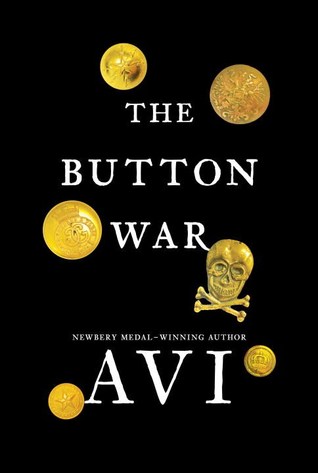 Jurek is a crazy idiot! The Russian soldiers have left our town, the Germans have moved in, and he thinks his button war is the most important thing in the world. He's challenged us to find the best button from a soldier's uniform, which is dangerous to do while they're still wearing it. I should ignore Jurek, but I can't back down from his dares. Things will get really bad for our group of friends if he wins the contest. I thought the German bomb that blew up our school was the worst thing, it killed our teacher, but this button war has made the danger of war even more personal. Two of my friends have been killed because of it! All Jurek can think about is who has the best button, which makes me keep searching for them. However, I just found something different on the body of a dead English man. I shouldn't have taken the pistol, but I did, and now I know Jurek has his eye on it.
Jurek is a crazy idiot! The Russian soldiers have left our town, the Germans have moved in, and he thinks his button war is the most important thing in the world. He's challenged us to find the best button from a soldier's uniform, which is dangerous to do while they're still wearing it. I should ignore Jurek, but I can't back down from his dares. Things will get really bad for our group of friends if he wins the contest. I thought the German bomb that blew up our school was the worst thing, it killed our teacher, but this button war has made the danger of war even more personal. Two of my friends have been killed because of it! All Jurek can think about is who has the best button, which makes me keep searching for them. However, I just found something different on the body of a dead English man. I shouldn't have taken the pistol, but I did, and now I know Jurek has his eye on it.
I don't normally read historical fiction, but the plot in this book moved quickly. As you might infer from my description above, Jurek's character drives the conflict. From the beginning, he displays a need to be the best at everything. The reason for this obsession is unclear, but Patryk, the narrator of the story, knows early on that Jurek is dangerous. Patryk doesn't want to look like a coward, so he accepts the challenges. As the plot moves along, Patryk's decisions are motivated by a need to protect his friends more than beating Jurek. Jurek is already a pain in the butt, but he would become dangerous if he were to win the button war; he's declared the winner of the contest will rule over everyone else. His callousness is a little upsetting, especially when his "friends" are hurt or killed. I used quotation marks, because I'm not sure Jurek actually has any real friends. The power he has over the group is amazing, since they all know he's crazy. I'm not sure how middle grade readers will react to the button war, it may not hold their interest, but the plot becomes much more interesting once the Germans arrive. The Button War is a thought-provoking tale about innocent kids caught in the middle of World War I.
 My name is Douglas, and I've lived with death all of my life; my parents own a funeral home. However, my thoughts about dying have drastically changed since the monster struck for the first time. The victims of the serial killer have had letters cut into their cheeks, apparently to show the days of the week they were killed. My best friend Lowell and I are determined to discover the identity of the Day Killer; kids are easily able to listen in on conversations and sneak around the town collecting clues. I didn't expect to become the target of the murderer. I haven't gotten a good look, but I know someone has been hiding in the shadows, waiting to get me. My dad says I know more about death than other kids, probably more than most adults. I hope Lowell and I can help the police catch the serial killer before I become his next victim.
My name is Douglas, and I've lived with death all of my life; my parents own a funeral home. However, my thoughts about dying have drastically changed since the monster struck for the first time. The victims of the serial killer have had letters cut into their cheeks, apparently to show the days of the week they were killed. My best friend Lowell and I are determined to discover the identity of the Day Killer; kids are easily able to listen in on conversations and sneak around the town collecting clues. I didn't expect to become the target of the murderer. I haven't gotten a good look, but I know someone has been hiding in the shadows, waiting to get me. My dad says I know more about death than other kids, probably more than most adults. I hope Lowell and I can help the police catch the serial killer before I become his next victim.
I've got to admit that I thought a middle grade book with a focus on death and a graveyard had to be in the fantasy genre. Nope. As I've described above, the plot's all about the kids searching for the murderer stalking the town, and Douglas trying to understand this new type of death. He's grown up understanding that death is a natural part of life, but murder is unnatural. He also tries to understand how his family's business fits into death and grieving, and he wonders about his own feelings. Does he want to go into funeral services when he grows up? These questions seem to be the actual focus of the book, as there are some questions left unanswered. The killer's no longer a problem in the end, but the author chooses to not reveal much about his identity or past. The character had no identification on him, and no one knew for sure why he committed the crimes. Also, there were two women who expressed concern about Douglas's living situation; they felt it wasn't healthy for him to grow up around death every day. They hinted that they might contact children's services, but nothing ever came of it. Douglas and his dad seemed to come to the conclusion that Douglas was okay, but there wasn't any information that the women had accepted it. There was an indication on the book's cover that this it included humor, but I didn't find much of it.
 My name is Maddie, and my seventh grade year has become very complicated. I bumped (literally) into the cutest boy a few days before the year started and instantly had a crush on Jacob. However, before I could tell my best friend Jana, she announced she had a crush on him. Now, we all know the BFF Code, right? You can't steal your BFF's boyfriend, so I couldn't tell anybody how I felt. I had hoped Jana would quickly lose interest, like always, but she didn't. I think I could have handled the problem, except Jacob and I were paired together for a Social Studies debate and had to work closely for two weeks. We got along great, and I knew he liked me. I've lied to Jana to save her feelings, but I'm afraid of what will happen when she finds out. Can you help me? What should I do?
My name is Maddie, and my seventh grade year has become very complicated. I bumped (literally) into the cutest boy a few days before the year started and instantly had a crush on Jacob. However, before I could tell my best friend Jana, she announced she had a crush on him. Now, we all know the BFF Code, right? You can't steal your BFF's boyfriend, so I couldn't tell anybody how I felt. I had hoped Jana would quickly lose interest, like always, but she didn't. I think I could have handled the problem, except Jacob and I were paired together for a Social Studies debate and had to work closely for two weeks. We got along great, and I knew he liked me. I've lied to Jana to save her feelings, but I'm afraid of what will happen when she finds out. Can you help me? What should I do?
This book is definitely for middle grade girls. It addresses many common problems they face at this age, and first crushes is the main focus of the plot. All middle grade students experience these feelings. In addition, Maddie's parents have high academic expectations, her sister is a high-achiever with a secret of her own, and Maddie has a fear of public speaking. My feelings? Well, I'm a grown man reading about the problems of a seventh grade girl, so I had some trouble connecting to her character. The plot was easy to follow, and the author told it from Maddie's point of view. This was obviously a great choice, since Maddie's feelings were the most important part of the plot. I understood Maddie's reluctance to hurt her friend's feelings, but things would have been so much easier if she was honest in the first place. A lesson learned for all! Overall, middle grade girls should enjoy this book and might get some hints on how to survive their early teenage years.
 Jurek is a crazy idiot! The Russian soldiers have left our town, the Germans have moved in, and he thinks his button war is the most important thing in the world. He's challenged us to find the best button from a soldier's uniform, which is dangerous to do while they're still wearing it. I should ignore Jurek, but I can't back down from his dares. Things will get really bad for our group of friends if he wins the contest. I thought the German bomb that blew up our school was the worst thing, it killed our teacher, but this button war has made the danger of war even more personal. Two of my friends have been killed because of it! All Jurek can think about is who has the best button, which makes me keep searching for them. However, I just found something different on the body of a dead English man. I shouldn't have taken the pistol, but I did, and now I know Jurek has his eye on it.
Jurek is a crazy idiot! The Russian soldiers have left our town, the Germans have moved in, and he thinks his button war is the most important thing in the world. He's challenged us to find the best button from a soldier's uniform, which is dangerous to do while they're still wearing it. I should ignore Jurek, but I can't back down from his dares. Things will get really bad for our group of friends if he wins the contest. I thought the German bomb that blew up our school was the worst thing, it killed our teacher, but this button war has made the danger of war even more personal. Two of my friends have been killed because of it! All Jurek can think about is who has the best button, which makes me keep searching for them. However, I just found something different on the body of a dead English man. I shouldn't have taken the pistol, but I did, and now I know Jurek has his eye on it.
